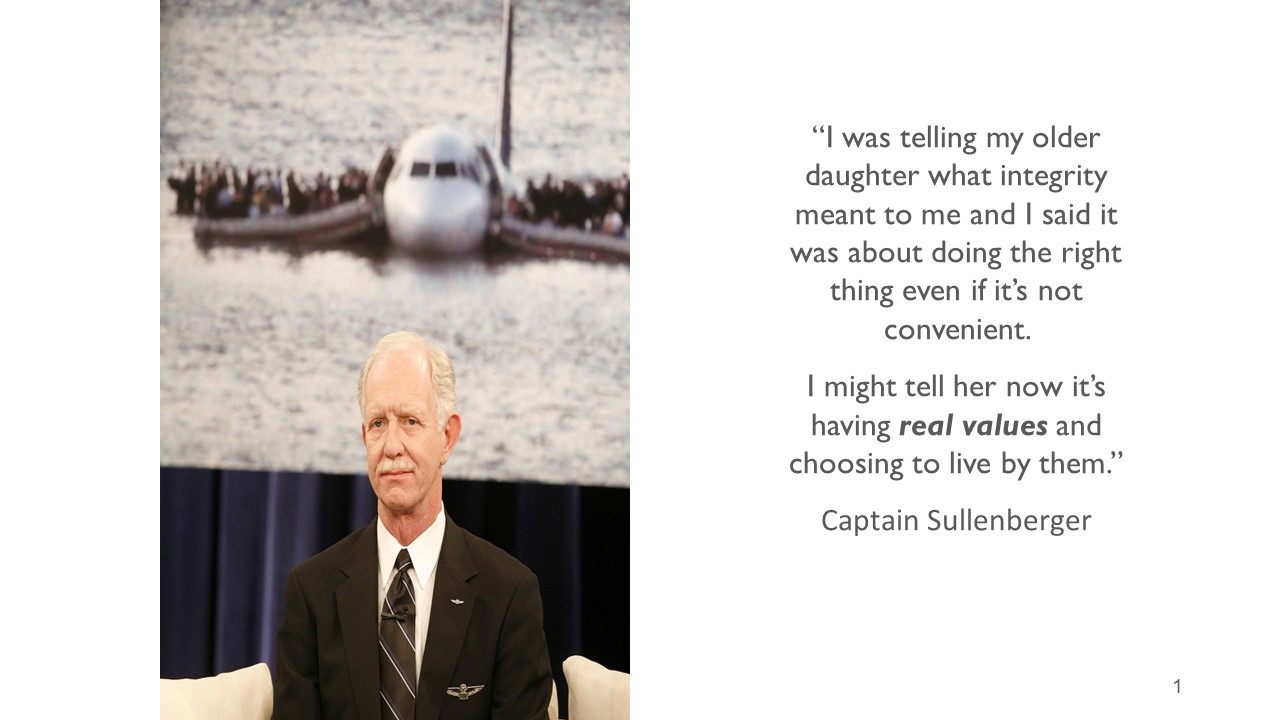
Using personal values to facilitate recovery and restoration in a post-pandemic world
By Dr. Scott Lichtenstein
The theme of this year’s World Values Day is Values and reconnecting. It is an opportunity for us all to reflect on our ‘inner compass’, especially our most deeply held invisible personal values that have a visible impact on our decisions and actions. The pandemic as well as other disruptions humanity faces has been a time of reassessment, and the crux of that reassessment is (re)connecting with our values and moral orientations.
Uncovering the invisible forces guiding our thoughts and emotions is ever more important in a time where our world is experiencing massive disruptions including the overshoot of our planetary boundaries of which climate change is but one, AI & robotics and a variety of inter-related Geopolitical, Economic, Social, Technological and Environmental factors. These myriad of forces facing us is sometimes referred to as our ever increasing Volatile, Uncertain, Complex and Ambiguous (VUCA) world. Indeed, the pandemic could be considered a VUCA event. In this VUCA world, connecting with our inner compass is not just a worthwhile thing to do, but a necessary survival mechanism to help prepare us to adapt to our changing world. Personal values guide the choices we make, the people we trust, the appeals we respond to, and the way we invest our time and energy (Posner & Schmidt, 1994). In turbulent times, personal values give a sense of direction amid conflicting views and demands.
Sully’s inner compass that saved 155 lives
Just how personal values gives a sense of direction amid conflicting views and demands is illustrated by the personal values-guided choices made by Captain Chesley ‘Sully’ Sullenberger on US Airways Flight 1549 in January 2009 that many may be familiar with.
t of us won’t ever have to steer an Airbus A320 full of passengers onto the Hudson River moments after suffering a ‘VUCA’ event of a flock of birds knocking out both engines, but Chesley ‘Sully’ Sullenberger and Jeffrey Skiles did. In January 2009, they safely landed US Airways Flight 1549 in the Hudson River off Midtown Manhattan, and remarkably, all 155 passengers and crew survived with only minor injuries.
He also said strategic leadership is about sacrificing short term gain for the long-term, however personally awkward. If you know the full story, you’ll know how personally awkward this event became for him: although he was considered a hero, the National Transportation Safety Board indicted him for ‘pilot error’ for neither returning to LaGuardia nor landing at another airport, Teterboro airport. An inditement would have resulted in him losing his pilot licence.
Sully sites his upbringing, family bonds and his own crucibles of experience for his inner compass (Sullenberger, 2009). In US Navy aviation training, Sullenberger investigated the air-crew ejection study where he learned that many pilots waited too long before ejecting from planes that were about to crash. Why? Many feared retribution if they lost a million-dollar jet: they were determined to try to save their airplanes, putting profit before their own lives.
“As soon as the birds struck,” he says, “I could have tried to return to LaGuardia so as not to ruin a US Airways aircraft. I could have worried that my decision to ditch the plane would be questioned by superiors or investigators. But I chose not to. By attempting a water landing, I would sacrifice the ‘airplane goal’—trying not to destroy an aircraft valued at $60 million—for the goal of saving lives.” (Zaslow, 2009). His personal values gave him a sense of direction: his inner compass valued people over profit, which prepared him for that moment, which resulted in a choice and action that saved the lives of everyone on board.
On World Value Day Sully’s example provokes us to ask of ourselves some coaching-guided questions, such as:
- Am I aware of how my inner compass, the convictions and personal values that guide my decisions?
- Is this reflected in my personal plans and behaviour? How can the links between my inner compass and intentions be more explicit? Am I role modelling it?
Putting these reflections in a management context highlights how being aware of how our values-guided decisions impacts others.
Top managements’ inner compass
In a prescient article in The Economist at the turn of this century, Peter Drucker (2001), the Austrian pracademic claimed an important task for top management in the next society’s corporation will be to balance its three dimensions: as an economic, human and as an increasingly important social organisation. The biggest challenge will be its social legitimacy: it’s values, mission and vision. Increasingly, he argued, top management will represent the unique personality of the company. Drucker couldn’t have foreseen the pandemic, but COVID-19 has put companies ‘inner compass’ in the spotlight. The social media reaction to Chief Financial Officer Chris Wootton and CEO Mike Ashley’s public letter to Boris Johnson insisting that Sports Direct should stay open after the ‘lockdown’ announcement because selling fitness equipment makes it an ‘essential business’ was met with contempt and anger. Even after it agreed to close, reports emerged of staff being instructed to go to work as normal, as were thousands of others on zero-hours contracts (Sutton, 2020). Similarly, the UK pub chain JD Wetherspoon has been accused of abandoning its 43,000 staff, saying it cannot afford to pay them until it is reimbursed by the government’s ‘furlough’ scheme, which pays 80% of employees’ wages. Chairman Tim Martin instead advised staff to seek work in Tesco. The hashtag #boycottWetherspoon trended on Twitter. A picture was circulating of the Wetherspoon’s pub in Crystal Palace, with the slogan ‘Pay your staff’ daubed in paint across the windows.
Contrast this with UK retailer Pret a Manger, which was one of the first to offer free hot drinks and half price food for NHS staff prior to having to close, or Dominos offering free pizza to NHS staff. Zipcar was providing free car journeys for NHS staff to get to and from work, while BrewDog has started manufacturing hand sanitiser to provide for free to hospitals in need (Sutton, 2020).
These examples illustrate that altruism and empathy are the currency of social legitimacy in a VUCA world, and a judging society will continue to scrutinise the inner compasses of top management.
Conclusion
World Values Day challenges us to go beyond a mechanical intelligence and have a deep dialogue that engages our and others’ hearts and minds. The pandemic has stimulated this reassessment. A recent poll of 570 American workers has revealed that the pandemic has given them a heightened understanding that life is short and that now is the time to make the changes they have long dreamed of (Long and Clement, 2021). This reassessment has kick starting a great reassessment of work: nearly 1 in 3 U.S. workers under 40 have thought about changing their occupation or field of work since the pandemic began (Long and Clement, 2021). At its core, this reassessment is a personal values reconnection. As we individually and collectively navigate the changing landscape from a personal values-centered perspective, may World Values Day invigorate this personal values reconnection already underway, and may it be grounded in responsibly caring for something we value as a path to realizing our dreams and those of others.
References
Drucker, P. (2001). ‘The next society’. The Economist. November 3rd. Special issue.
Long, H and Clement, S. (2021) Nearly a third of U.S. workers under 40 considered changing careers during the pandemic. The Washington Post, August 16, Accessed: https://www.washingtonpost.com/business/2021/08/16/us-workers-want-career-change/
Posner, B. Z., & Schmidt, W. H. (1994). An updated look at the values and expectations of federal government executives. Public Administration Review, 20-24.
Sullenberger, C. (2009). Highest Duty: My Search for What Really Matters. William Morrow/HarperCollins Publishers.
Sutton, P. (2020). We Won’t Forget The Businesses That Treat Their Staff — And Us — Badly. HuffingtonPost, 26/03
Waki, N. (2011). Hudson pilot tells business leaders to look beyond short-term. Davos Notebook. January 26.
Zaslow, J. (2009) What We Can Learn From Sully’s Journey. WSJ. Oct. 14
About the Author

Dr Scott Lichtenstein coaches, advises and teaches personal values-guided strategy for individuals and leadership teams. As Founder of EVS Consulting, he created the Personal Orientation Survey instrument and report for uncovering individual and collective personal values and the Personal Vales Self-Assessment. He is co-author of Strategy through Personal Values – A Behavioural Approach, Palgrave McMillian. Scott has published many articles and book chapters concerning personal values-guided strategy, leadership and corporate governance.





